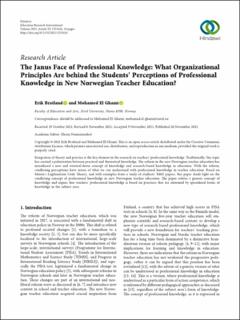| dc.contributor.author | Bratland, Erik | |
| dc.contributor.author | el Ghami, Mohamed | |
| dc.date.accessioned | 2022-01-25T13:45:21Z | |
| dc.date.available | 2022-01-25T13:45:21Z | |
| dc.date.created | 2021-11-26T15:04:54Z | |
| dc.date.issued | 2021 | |
| dc.identifier.citation | Bratland, E. & el Ghami, M. (2021). The Janus face of professional knowledge: What organizational principles are behind the students’ perceptions of professional knowledge in new Norwegian teacher education? Education Research International, 1253416. doi: | en_US |
| dc.identifier.issn | 2090-4010 | |
| dc.identifier.uri | https://hdl.handle.net/11250/2839259 | |
| dc.description.abstract | Integration of theory and practice is the key element in the research on teachers’ professional knowledge. Traditionally, this topic has created a polarization between practical and theoretical knowledge. The reform in the new Norwegian teacher education has introduced a new and watered-down concept of knowledge and research-based knowledge in education. With the reform, conflicting perceptions have arisen of what we can understand with professional knowledge in teacher education. Based on Maton’s Legitimation Code Theory, and with examples from a study of students’ R&D papers, this paper sheds light on the conflicting concept of professional knowledge in new Norwegian teacher education. The paper refutes a generic concept of knowledge and argues that teachers’ professional knowledge is based on practices that are informed by specialized forms of knowledge in the subject area. | en_US |
| dc.language.iso | eng | en_US |
| dc.publisher | Hindawi | en_US |
| dc.rights | Navngivelse 4.0 Internasjonal | * |
| dc.rights.uri | http://creativecommons.org/licenses/by/4.0/deed.no | * |
| dc.title | The Janus Face of Professional Knowledge : What Organizational Principles Are behind the Students’ Perceptions of Professional Knowledge in New Norwegian Teacher Education? | en_US |
| dc.type | Peer reviewed | en_US |
| dc.type | Journal article | en_US |
| dc.description.version | publishedVersion | en_US |
| dc.rights.holder | © 2021 The Author(s) | en_US |
| dc.subject.nsi | VDP::Samfunnsvitenskap: 200::Pedagogiske fag: 280 | en_US |
| dc.source.journal | Education Research International | en_US |
| dc.identifier.doi | 10.1155/2021/1253416 | |
| dc.identifier.cristin | 1959895 | |
| dc.source.articlenumber | 1253416 | en_US |

